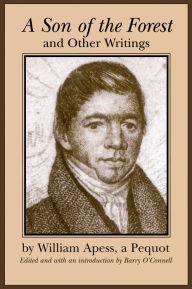William Apess
William Apess (1798–1839, Pequot) (also known as William Apes before 1837), was an ordained Methodist minister, writer, and activist of mixed-race descent, who was a political and religious leader in Massachusetts. After becoming ordained as a Meth
... Read more
William Apess (1798–1839, Pequot) (also known as William Apes before 1837), was an ordained Methodist minister, writer, and activist of mixed-race descent, who was a political and religious leader in Massachusetts. After becoming ordained as a Methodist minister in 1829, he published his autobiography the same year. It is among the first autobiographies by a Native American writer. Apess was part Pequot by descent, especially through his mother's family, and identified with their culture.
In 1833, while serving as an itinerant preacher in New England, Apess visited the Mashpee on Cape Cod. Hearing their grievances against white overseers and settlers who stole their wood, he helped organize what was called the Mashpee Revolt of 1833-34. Their attempt to regain civil rights was covered sympathetically by the Boston Advocate, but criticized by local journals on Cape Cod. Apess published a book about the experience in 1835, which he summarized as "Indian Nullification."
Apess alienated many of his supporters before dying in New York City at age 41, but he has been described as "perhaps the most successful activist on behalf of Native American rights in the antebellum United States.
Less






